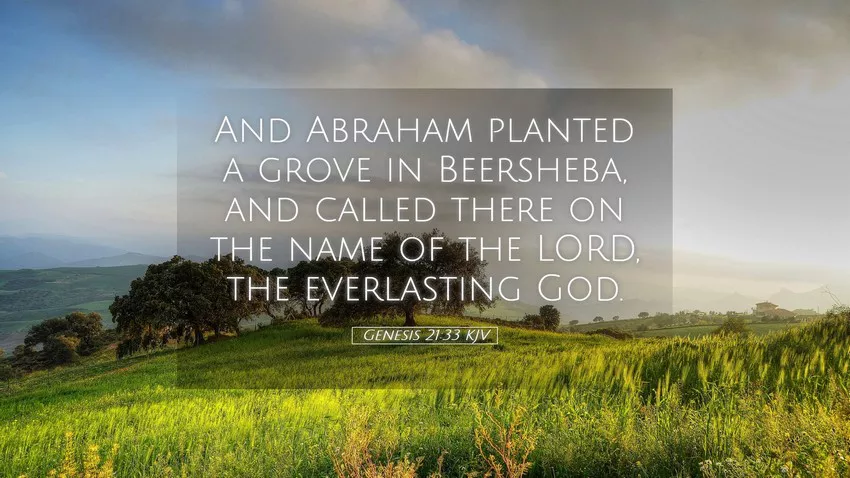Read the Daily Bible Verse – Genesis 21:33 To Strengthen Your Spiritual Journey.
Genesis 21:33 is a verse that captures a significant moment in the life of Abraham and provides rich insights into Biblical covenants and their implications. This article will explore the context, meaning, application, and relevance of Genesis 21:33, comparing it with other Biblical texts and discussing its significance in modern life.
The Context of Genesis 21:33 KJV
Genesis 21:33 is set within a broader narrative involving Abraham, his dealings with Abimelech, and the establishment of a well.
Historical Setting
Genesis 21 describes key events in the life of Abraham. The chapter includes the birth of Isaac, the departure of Hagar and Ishmael, and the covenant between Abraham and Abimelech. By this time, Abraham was a significant figure in the region, known for his faithfulness to God and his interactions with local rulers.
Genesis 21:33 KJV
The King James Version (KJV) of Genesis 21:33 reads:
“And Abraham planted a grove in Beersheba, and called there on the name of the LORD, the everlasting God.”
This verse follows the establishment of the covenant between Abraham and Abimelech, which was symbolized by the naming of Beersheba. Abraham’s planting of a grove and calling upon the name of the LORD marks a profound act of worship and a declaration of his faith.
The Genesis 21:33 Meaning
Genesis 21:33 is rich with symbolism and meaning. It highlights Abraham’s faithfulness and reverence for God.
Planting a Grove
The act of planting a grove can be seen as a significant gesture. In ancient times, planting a grove or a tree was often associated with making a lasting commitment or establishing a place of worship. For Abraham, this act symbolized the establishment of a permanent place of worship and recognition of God’s presence in his life.
Calling on the Name of the LORD
Calling on the name of the LORD signifies Abraham’s reliance on and reverence for God. It reflects a deep personal relationship with God, recognizing Him as the “everlasting God.” This title underscores God’s eternal nature and unchanging faithfulness, highlighting the trust Abraham placed in Him.
See Also: What Does Genesis 21:32 Mean?
Genesis 21:33 Application in Life
Genesis 21:33 provides valuable lessons for contemporary Christians, particularly in the areas of worship, commitment, and faith.
Commitment to Worship
Abraham’s act of planting a grove and calling on the LORD emphasizes the importance of creating spaces and moments dedicated to worship. For modern Christians, this can translate into making time for prayer, establishing places of worship, and integrating faith into daily life.
Acknowledging God’s Everlasting Nature
The reference to “the everlasting God” reminds us of God’s eternal and unchanging nature. This acknowledgment can provide comfort and stability in our own lives, encouraging us to trust in God’s enduring faithfulness regardless of our circumstances.
Comparison with Other Biblical Texts
Genesis 21:33 can be compared with other Biblical passages that emphasize worship, covenant, and the nature of God.
Genesis 12:7
In Genesis 12:7, we find a similar instance of Abraham building an altar and calling upon the LORD:
“And the LORD appeared unto Abram, and said, Unto thy seed will I give this land: and there builded he an altar unto the LORD, who appeared unto him.”
This earlier act of building an altar and calling on the LORD underscores Abraham’s pattern of worship and commitment throughout his journey.
Psalm 104:16
Psalm 104:16 provides a poetic reflection on the groves or trees planted by God:
“The trees of the LORD are full of sap; the cedars of Lebanon, which he hath planted.”
This verse echoes the symbolism of planting and the connection between God’s creation and His eternal presence.
Modern-Day Relevance
Genesis 21:33 remains relevant in today’s world, offering lessons on worship, faith, and commitment.
Creating Spaces for Worship
In contemporary life, creating dedicated spaces for worship—whether in a church, home, or personal time of prayer—can help strengthen our relationship with God. The example of Abraham reminds us of the importance of setting aside time and space for spiritual practices.
Trusting in God’s Eternal Nature
Recognizing God as the “everlasting God” encourages us to place our trust in His eternal presence. In times of uncertainty or change, this reminder can offer stability and assurance, reinforcing our faith in God’s unchanging nature.
Conclusion
Genesis 21:33 is a powerful testament to Abraham’s faithfulness and reverence for God. Through the act of planting a grove and calling on the name of the LORD, Abraham established a lasting symbol of his commitment and worship. This verse provides enduring lessons on the importance of worship, recognizing God’s eternal nature, and maintaining a faithful relationship with Him.
Genesis 21:33 Commentary
Genesis 21:33 captures a significant moment in Abraham’s journey, illustrating his deep faith and commitment to God. The act of planting a grove and calling on the LORD highlights the importance of creating meaningful symbols of worship and acknowledging God’s everlasting nature. This verse serves as a timeless reminder of the value of dedication, worship, and trust in God, offering valuable insights for both historical and contemporary contexts.
In summary, Genesis 21:33 is more than a historical record; it is a profound lesson on faith and worship that continues to inspire and guide believers today.


